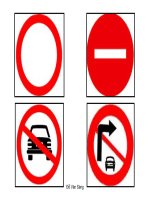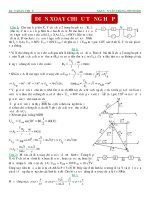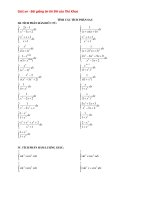Tong hop day du Verb Patterns
Bạn đang xem bản rút gọn của tài liệu. Xem và tải ngay bản đầy đủ của tài liệu tại đây (125.83 KB, 3 trang )
VERB PATTERNS
I. TO-INFINITIVE:
1. Làm chủ ngữ: Ex: To visit her is all that I desired.
2. Làm bổ ngữ: Ex: What I like is to swim in the sea and then to lie on the warm sand.
3. Sau các động từ sau:
V + To-Inf
Accept
Agree
Arrange
Attempt
Decide
Deserve
…
Determine
Desire
Expect
Fail
Hesitate
Hope
Intend
Learn
Manage
Mean (có ý định)
Neglect
Offer
Plan
Prefer
Pretend
Prepare
Promise
Refuse
Seem
Threaten
Try (cố gắng)
Want
Wish
Would like
Ex: He didn’t want to be left alone.
She decided to study abroad.
To-Inf cũng được sử dụng sau các ngữ động từ sau:
Make up one’s mind (quyết định) + To-Inf
Make sure (chắc chắn) + To-Inf
Have a chance + To-Inf = Have an opportunity + To-Inf
V + O + To-Inf
Advise
Allow
Ask
Assume (thừa nhận)
Beg
Consider
Enable
Encourage
Expect
Forbid
Force
Invite
Order
Permit
Persuade
Prefer
Teach
Tell
Urge (thúc giục)
Warn
…
Ex: He advised me to give up smoking.
4. Sau các tính từ:
Afraid
Amused
Annoyed
Anxious
Ashamed
Astonished
Boring
Careful
Curious
Dangerous
Determined
Difficult
Eager
Easy
Hard
Grateful
Happy
…
S + be + Adj + To-Inf
It + be + Adj + (for sb) + To-Inf
Ex: I am curious to know the news.
It’s + adj + to V = Ving + to be + adj
Ex: It’s very useful to know English nowadays.
= Knowing English is very useful nowadays
5. Sau những từ hỏi như: WHAT, WHO, WHERE, WHEN, WHY, WHICH…
Ex: He discovered how to open the safe.
She couldn’t think what to say.
6. Được dùng để chỉ mục đích:
Ex: He saved money to buy a bicycle.
7. Được dùng trong các cấu trúc sau:
It takes + somebody + (time) + To-inf
Ex: It takes me fifteen minutes to walk to school.
S + V + TOO + adj/adv + (for sb) + To-inf
Ex: He is too young to get married.
S + V + adj/adv + ENOUGH + (for sb) + To-inf
S + V + ENOUGH + Noun + (for sb) + To-inf
Ex: He is not old enough to get married.
II. BARE INFINITIVE:
1. Sau các động từ khiếm khuyết (can, may, must, will, shall, should…)
Ex: I can speak English.
2. Sau các ngữ động từ như: had better, would rather…
Ex: We would rather not go with him.
3. Sau động từ MAKE, LET
Make + O + Inf
Let
Ex: The news made him look anxious.
Note: Be made + To-Inf (passive voice)
Be let
III. V-ING
1. Làm chủ ngữ: Ex: Dancing bored him
2. Làm bổ ngữ: Ex: Her hobby is painting
3. Sau các động từ sau:
V + V-ing
Admit
Avoid
Appreciate
consider
delay
deny
enjoy
finish
mention
mind
miss
postpone
practise
quit
recall
risk
suggest
imagine
keep
like
dislike
love
hate
…
ex: We enjoy playing football
V + O + V-ing
call
catch
discover
find
imagine
keep
leave feel
hear …
Ex: I caught him reading my letter.
Note: S + SPEND/WASTE + (time/money) + V-ing / on something
Ex: I spent two years working in London.
PREFER + V-ing + TO + V-ing = WOULD RATHER + Inf + THAN + Inf
Ex: I would rather go to the cinema than stay at home.
I prefer going to the cinema to staying at home.
4. Sau giới từ:
a. Verbs + prep + V-ing : to thank for, to look forward to, to insist on, to give up, to put
off, to forgive sb for, to prevent sb from, to succeed in, to appologize to sb for …
ex: John gave up smoking.
b. to be + adj + prep + Ving :to be busy with, to be afraid of , to be good at, to be bad at,
to be interested in = to be fond of = to be keen on …
ex: Alice is fond of dancing.
5. Sau các thành ngữ như:
It’s no good + V-ing :(Chẳng tốt) be worth + V-ing
It’s no use + V-ing :(Chẳng ích gì) be busy + V-ing
can’t bear + V-ing = can’t stand + V-ing have difficulty (in) + V-ing
can’t help + V-ing
6. Sau các từ / cụm từ : when, while, before, after, without, because of, instead of, in
spite of, despite …
Ex: He continued to speak while walking down the path.
7. Sau cấu trúc “go + Ving”
go swimming / go fishing / go dancing / go shopping / go camping …
IV. START / BEGIN / CONTINUE + TO-INF(no meaning change)
V-ING
Ex: It started to rain.
raining.
HELP + O + TO-INF / INF (no meaning change)
Ex: He helped me to do / do my homework.
V. VERBS OF PERCEPTION (động từ giác quan): see, hear, feel, smell, taste, notice,
watch…
S + V + O + Inf (ám chỉ 1 việc đã hoàn thành )
V-ing (ám chỉ một việc còn đang tiếp diễn )
Ex: I see him do his morning exercises in the garden everyday.
I saw a beautiful girl walking a long the road yesterday afternoon.
Note: Cấu trúc bị động của những động từ này:
S + be + V
3
+ TO-Inf
V-ing
Ex: She was seen to get off the bus.
VI. ALLOW / PERMIT / RECOMMEND / ADVISE
S + allow / permit / recommend / advise + O + To-Inf
S + allow / permit / recommend / advise + V-ing
Ex: The teacher permitted them to turn the assignment in late.
The teacher permitted going out.
VII. NEED
Need + Inf / To-Inf (mang nghĩa chủ động)
Need + V-ing (mang nghĩa chủ động)
Ex: I need water / to water the flowers
The flowers need watering / to be watered
Note: need / require / want + Ving = Passive voice
VIII. USED TO, BE USED TO…
Used to + Inf : đã từng… (thói quen trong quá khứ mà bây giờ không còn nữa)
Be used to + V-ing: quen với… (thói quen ở hiện tại)
Get used to + V-ing: trở nên quen với…
Be used to + Inf = Be used for + V-ing: được sử dụng để…
Ex: I used to live in the city.
She is/gets used to getting up early.
This knife is used to cut bread.
is used for cutting bread.
IX. CAUSATIVE FORM (thể truyền khiến)
Active: S + HAVE + someboby + V-Inf + something
= S + GET + somebody + To-inf
Passive: S + HAVE + something + P.P
= S + GET + something + P.P
Ex: I have my father fix my bicycle.
I have my bicycle fixed by my father.
X. STOP – TRY – REMEMBER – FORGET - REGRET
- stop + V-ing: ngừng hẳn hành động đang làm
Ex: Stop making noise, please!
- stop + To-inf: ngừng lại để làm việc
khác
Ex: She stopped to talk to him.
- try + V-ing: thử làm điều gì
Ex:He tries writing with his left hand.
- try + To-inf: cố gắng làm việc gì
Ex: We try to get high marks.
- remember +V-ing: nhớ đã làm gì
Ex: I remember locking the door before I left.
- remember + To-inf: nhớ phải làm gì
Ex: I remember to call him.
- forget + V-ing: quên điều gì đã làm
Ex: I forgot meeting her.
- forget + To-inf: quên làm điều gì
Ex: I forgot to shut the window.
- regret + V-ing: hối tiếc điều gì đã làm
Ex: I regret talking to him so impolitely.
- regret + To-inf: hối tiếc phải làm gì
Ex: I regret to tell you that you failed
the exam.
XI. PARTICIPLES
1. Present Participles (V-ing): 2. Past Participles (V
3
):
a. Đi với TO BE để thành lập các thì tiếp diễn
ex: He was telling me about his life.
a. Đi với các hình thức của động từ TO
HAVE để thành lập các thì hoàn thành và
đi với TO BE để thành lập thể bị động.
ex: That man has stolen my purse.
I was given a doll on my birthday.
b. Để nối hai câu có cùng chủ ngữ (mang
nghĩa chủ động) hoặc diễn tả các hành động
kế tiếp nhau
Ex: When we stood on the hill, we could see
the river.
Standing on the hill, we could see the
river.
Ex: Mary is sitting at the desk, looking out of
the window, thinking of her future.
b. Để nối hai câu có cùng chủ ngữ (mang
nghĩa bị động)
ex: When he was punished yesterday, he
felt very sad.
Punished yesterday, he felt very sad.
c. Thay thế cho mệnh đề quan hệ mang nghĩa
chủ động
ex: The man who talked to you yesterday is
my teacher.
The man talking to you yesterday is my
teacher.
c. Thay thế cho mệnh đề quan hệ mang
nghĩa bị động
ex: The boy who was given a present is my
son.
The boy given a present is my son.
d. Dùng làm tính từ (mang nghĩa chủ động):
ex: The story was boring.
d. Dùng làm tính từ (mang nghĩa bị động):
ex: I was bored with the story.









